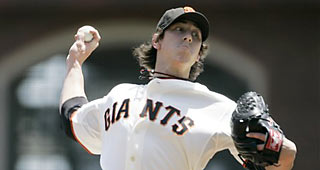Nine of Tim Lincecum?s 13 outs on Tuesday night came by way of the strikeout, so why is a pitchout called on an 0-2 count with two outs in the 4th inning?
Seth Smith took that free ball, which broke Lincecum?s rhythm and eventually ran the count to 3-2 before Smith hit a ground-rule double to right center.
Omar Quintanillia, who could have walked home from first on the play, was forced to go back to third, which was the first of two fortunate breaks for Lincecum.
After the game I spoke with both Smith and Quintanillia about the 0-2 pitchout.
"It was just ball one to me," said Smith, who also homered to the opposite field to lead off the third. "I didn't think much of it."
Quintanillia was initially running on the play, but he said he noticed the sidestep and held up, quickly returning to first base.
"It was strange," Quintanillia finally said after we talked about the situation for a few moments.
With Quintanillia on third and Smith on second and after getting ahead of Troy Tulowitzki 0-2, he missed high with a reach-back 96 MPH fastball, and then Rich Aurilia booted a sharp grounder to third in which he was forced down to his knees, allowing two runs to score.
The official scorer generously called the play an error, turning those two 4th inning runs allowed by Lincecum into unearned runs.
(Update: Michael Duca, the official scorer, changed the ruling after the game to a hit, raising Lincecum's ERA to 2.66.)
His ERA escaped the inning unscathed, but his pitch count climbed to 86. And after reaching base on a walk in the bottom half of the inning, Lincecum took off on two separate 3-2 counts to Randy Winn before going back out to the mound for the top of the fifth.
He initially retired Brad Hawpe to ground out to begin the inning, but it was the final out he?d record. He proceeded to walk Chris Iannetta on four pitches, and then an opposite field double to left by Ian Stewart came on his 102nd and final pitch of the game before Bruce Bochy took the ball from Lincecum.
Keiichi Yabu allowed the two runners he inherited from Lincecum to score.
Following the game, Lincecum was very visibly disappointed with the outing.
"My body feels good," said Lincecum. "My arm feels good. I wasn't able to establish any rhythm."
Lincecum comes away from Tuesday?s start without a win and with an ERA that has climbed from 2.46 to 2.58, but he?s very fortunate that it isn?t the 2.66 it would have been without the Aurilia play ruled an error.
He needed to push his record to 18-4 as much as he needed to maintain or lower his ERA, and the 0-2 pitchout to Smith, more than any other single pitch or error/non-error, cost Lincecum.
And now, even more than before he took the mound Tuesday, in order for the Giants to produce their first Cy Young award winner since Mike McCormick, voters will need to base their decision on criteria that are the opposite of those that won it for McCormick back in 1967.
McCormick was a near unanimous winner, finishing with 18 first place votes to just one apiece for Jim Bunning of the Phillies and Fergie Jenkings of the Cubs.
But both Bunning and Jenkins had a better ERA (2.29 and 2.80 versus 2.85), WHIP (1.04 and 1.08 versus 1.15) and more strikeouts (253 and 236 versus just 150 for McCormick).
The difference was that McCormick went 22-10 while Bunning went 17-15 for a Phillies team that finished 82-80, and Jenkins went 20-13 for the 87-74 Cubs.
Will Brandon Webb's superior W-L record, but inferior statistical numbers sway voters away from Lincecum following Tuesday's disappointing performance when he couldn't pick up his 18th win? They shouldn't, but they might and Lincecum wants another shot on Sunday against the Dodgers.
"I want to make a bounce back from this," said Lincecum, referring to Sunday's potential start. "I want that ball."
Though he claims to not be thinking about the Cy Young, he also wants (and deserves) it.
Lincecum's Cy Young Bid Derailed By 0-2 Pitchout?


